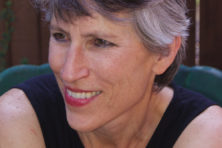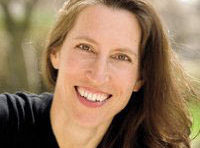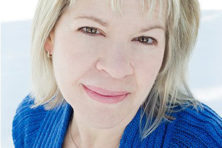Questions & Authors: Jane Hamilton
- Share
- Tweet
- Pin
- Share

If you’ve ever been caught up in a novel and read 100 pages without feeling like any time has passed, you know the power novels can have. Here, Jane Hamilton – the 2020 Hal Prize fiction judge and the internationally bestselling author of The Book of Ruth, A Map of the World and The Excellent Lombards (and others) – answers questions about herself, her work and literature’s power to help in tough times.
Can you tell me a little about yourself?
I grew up in Oak Park, Illinois – birthplace of Ernest Hemingway – but of far more importance to me, the writer Carol Shields. My mother wrote poems and short stories; my grandmother was a journalist and wrote a novel in her retirement. I grew up in a reading culture, in a house full of books, in a community that valued the arts, and because the writers in my family were women, I assumed that a girl-child must grow up to write.
What are some of the common themes in your work?
I’m not sure I’m the best person to tease out the common themes in my work. I don’t think in terms of themes, but rather trouble, predicaments, and always there’s my wish to probe the mystery of personality. What makes people do the things they do?
I approach that question not as a psychologist would, I think, but with a sense of wonder, and with the knowledge that in a novel or story, a person can be known in a way that they cannot be known in real life. The inner life is revealed on the page, or anyway it is the writer’s task to try to reveal as best she can that inner life.
Whatever themes emerge from the story at hand are the themes – I’ve written about land use, gay rights, the Vietnam War, racism, farm succession, but theme for me is not the starting or really the end point.
When I was growing up, I would often tag along with one of my closest friends to our local library. She checked out The Short History of a Prince and A Map of the World as soon as they came out and would read them in record time. She was a dairy farmer’s daughter and seemed to have a deep connection to your work. What do you think people connect with in your work?
Again, I’m not the person who can answer that question. I write the novels I feel compelled to write. I write them in isolation. I write from a sense of urgency: This is the book I have to write in this moment. It seems a miracle to me, then – an astonishment – that there are readers who have connected to the books. I am extremely grateful to them.
Place – especially Wisconsin – seems to play an important role in your novels. Why do you choose this as a setting for much of your work?
Well, this is a shabby answer: I live in Wisconsin. When I moved to Wisconsin, to a small town, after essentially being an urban person, I felt like an anthropologist in a foreign culture. Which is ideal for someone who wishes to write – to be the outsider, to be looking in. I am now, after 40 years, not so much an outsider, but there is still plenty in Wisconsin to keep me interested.
What piece of writing – a novel, article, poem – has most influenced your work and why?
I return to Willa Cather again and again. And again. Her essays on writing, her novels – the small jewels – Lucy Gayheart and A Lost Lady. The Professor’s House is a favorite. Upon my death I would be happy – and not at all surprised – to find out that all along Willa Cather has been God.
What is your writing space like?
It’s currently a mess. Lots of books, the letters of my dead relatives that I’m sorting through on the floor, and counter space that’s cluttered with papers. The chapters of the book I’m working on, the books I’m reading in relation to it. The windows look out to the orchard where I live and my garden, and it’s a gray day, which makes me happy. And although everyone is staying home – and it is a terrible, awful time – I admit to being happy in my office.
What’s your writing routine?
I like to write every day. Because I like to write. Because I feel better if I can get even a little something on paper.
Do you have a novel that you are particularly proud of?
I don’t go back to them. I loved writing certain characters very much. Walter in the Short History, Henry Shaw in Disobedience – those teenage boys, I adored them.
The world seems to be in an unsettled state right now. Where do (or how can) you find solace in literature?
Watching great TV tends, after a certain period, to scald my eyeballs. Reading settles my mind and spirit and nourishes me. There is the sense in a great book that life – all of this, what is beautiful and awful – will endure because one person’s mind has radiated the terror and the beauty to another person by way of language. How can the world not go on when that miracle exists?
To get more information about the 2020 Hal Prize or to submit works of fiction, nonfiction, poetry or photography, go to www.thehalprize.com. Also check out the Feb. 26 episode of the Door County Pulse Podcast, available now at doorcountypulse.com/podcast-introducing-the-8142-review.





